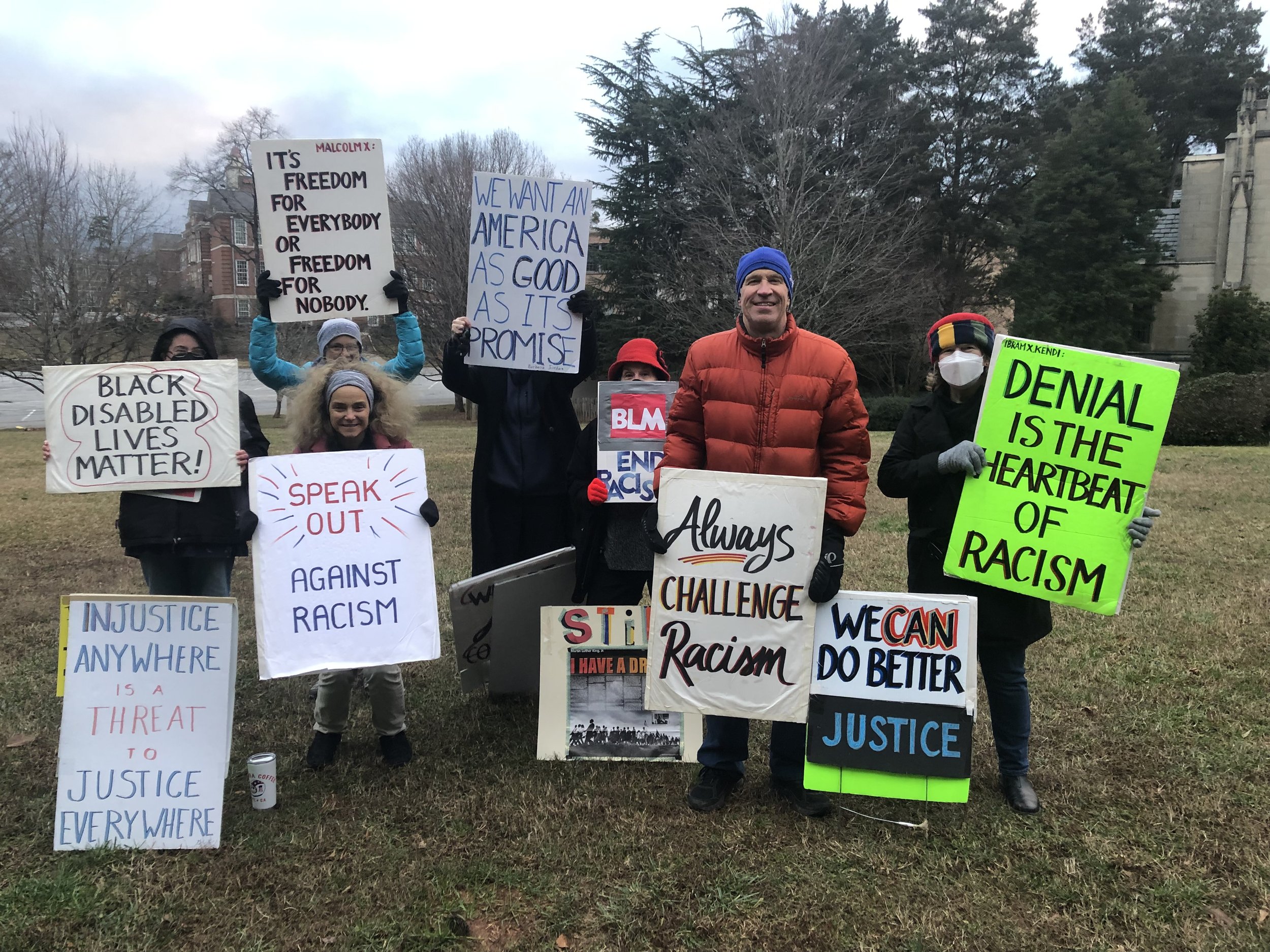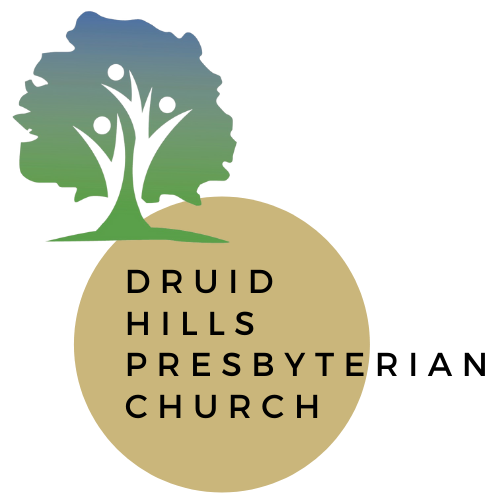
Every Month, we try to introduce a new idea for combating racism though various means

-
November 2025
Learning about civil rights heroes and history can provide both context and inspiration for our work of combating racism. One recent example is the documentary Andrew Young: The Dirty Work, produced by Rachel Maddow, which recently premiered on MSNBC. Through interviews with Maddow, 93-year-old Andrew Young narrates the documentary, reviewing his long career as a pastor, activist, politician, and diplomat. The documentary begins as Young explains how he began working for Dr. Martin Luther King, Jr., who initially hired Young to answer his mail, telling Young he wanted someone to handle the dirty work. The footage takes us through the 60s civil rights movement, King’s funeral in Atlanta, Young’s success as the first African American elected to Congress from Georgia since Reconstruction (5th district, 1972), his position as the UN ambassador for Jimmy Carter, and his serving as Atlanta’s mayor. For info on how to view the documentary or a panel discussion about the film featuring Andrew Young and Rachel Maddow, visit https://tinyurl.com/DHPCDirtyWork.
-
October 2025
Five Years after George Floyd… where are we now?
In just five years, the U.S. has gone from the nationwide calls for justice under Black Lives Matter to a sweeping backlash—laws banning DEI, purges of “divisive” content, and widespread book bans targeting Black, Indigenous, LGBTQ+, and other marginalized voices. This shift reflects efforts to control narratives about race, power, and history. This year, Georgia advanced legislation to restrict DEI programs in schools and universities, banning initiatives tied to race, gender, or sexuality. At the same time, districts across the state removed numerous books addressing race, identity, and LGBTQ+ themes under newly strengthened censorship policies.
So, what can we do to push back? Whose good work can we support?
Defend libraries and classrooms: challenge bans through legal action and public advocacy:
Visit Georgia Library Association – https://gla.georgialibraries.org/Advocacy
Support and preserve diverse voices: authors, educators, archives, and community histories:
Explore Georgia Humanities – https://www.georgiahumanities.org
Engage locally because school boards, municipal policies, and grassroots networks often set the stage for change.
Connect with ACLU of Georgia – https://www.acluga.org
-
September 2025
In response to recent attacks on the Smithsonian’s National Museum of African American History in Washington, DC, Gigi Muirheid offers this firsthand account of her recent visit: “Last month I was able to visit the NMAAHC. During a 3-hour visit, I only had time to see several of the five floors. Starting with the bottom floor exhibits on the Middle Passage, I worked my way up to the second floor where artifacts from Reconstruction through the Civil Rights era of the 1960s are on display. Here I could see things that I have known about in my lifetime: a dress sewn by Rosa Parks, posters for the NAACP, a segregated train car, and bar stools from the 1960s lunch counter in the Greensboro, NC Woolworth’s. My high school biology teacher took part in these sit-ins and told us stories about them in class. I look forward to returning to the museum and encourage you to visit too! In the meantime, visit https://tinyurl.com/DHPCDefendingFreedom to see some of the many exhibits available.”
-
August 2025
This month offers key opportunities to confront racism and to honor global struggles for justice:
August 9, International Day of the World’s Indigenous Peoples, recognizes the 476 million Indigenous people across 90 countries who preserve over 5,000 cultures and speak most of the world’s 7,000 languages—yet face disproportionate poverty and systemic discrimination. August 23, International Day for the Remembrance of the Slave Trade and its Abolition, honors the victims of transatlantic slavery and those who worked to abolish it. August 28 is the anniversary of the 1963 March on Washington, where Dr. King shared his dream—a call we must still answer today.
Together, these commemorations challenge us to move beyond memory into sustained action. For more info, search for these topics on the United Nations / UNESCO websites and on history.com.
-
July 2025
This year marks the tenth-anniversary release of Ta-Nehisi Coates’ Between the World and Me. Listen to his interview with NPR’s Michel Martin: https://www.npr.org/2025/07/07/1255296733/nprs-book-of-the-day-ta-nehisi-coates-between-the-world-and-me-anniversary
Coates’ book was released shortly after the 2015 shooting at Mother Emanuel AME Church in Charleston, SC, and soared in popularity after George Floyd’s murder in 2020— an event that propelled many books on race to bestseller lists. But now those same works face bans and restrictions in school curricula. Coates notes that this tension – books being sought after and then suppressed – is not new. He recalls Toni Morrison, a towering literary figure, enduring censorship throughout her career.
A comparable book we might turn towards with advice from a Black man to a younger family member is James Baldwin’s 1963 letter to his nephew, The Fire Next Time. Baldwin’s book may be seen as more hopeful than Coates’ – he puts more faith in love as a power that can transform a nation.
-
June 2025
On Wear Orange Sunday (June 1), we recognize that gun violence is a racial justice issue. While gun violence affects us all, we know that it disproportionately impacts Black and Brown people. A Black person is over 10 times more likely than a white person to die by firearm homicide. Hispanic/Latino people are over twice as likely, and Indigenous people are almost 3.5 times more likely to be killed by a firearm compared to white people. Community-based groups, led by BIPOC organizers, have worked relentlessly to develop community-based solutions that successfully reduce gun violence for all of us. To learn more, listen to this podcast from Brady, a gun violence prevention organization. https://www.bradyunited.org/resources/podcast/45-on-the-front-lines
-
May 2025
Take time to learn about and be inspired by figures in Black history and culture. One such figure was Paul Robeson (1898–1976), an extraordinary African American artist, scholar, and activist. His life is a powerful story of resilience against racism. Born to a former enslaved father, Robeson graduated from Rudgers, Phi Beta Kappa, where he played football as an All-American. After earning a law degree from Columbia, he abandoned the practice of law for the stage where his baritone voice won recognition.
Robeson rose to fame as a world-renowned singer and actor, starring in productions like Othello and Show Boat, while using his platform to speak out against injustice. During the 1930s, 40s, and 50s—an era marked by harsh racial segregation—he became a fearless advocate for civil rights and labor rights, in the U.S. and abroad. Despite facing government surveillance, blacklisting, and the revocation of his passport, Robeson remained steadfast in his commitment to equality, leaving a legacy of courage, dignity, and unshakable moral vision. May Robeson’s story - and the stories of other visionary Black leaders - inspire us all to combat racism today!
-
April 2025
Environmental Justice for All
Spring awakens the world with renewal, color, and life, reminding us of nature’s power to heal
and flourish. Yet, for marginalized communities the promise of fresh air and clean water can be overshadowed by their living conditions—where pollution, hazardous waste, and climate disasters disproportionately impact their health and safety. As we celebrate Earth Month, let us also take action for environmental justice. Advocate for policies that protect vulnerable communities, support organizations addressing environmental inequities, and amplify the voices of those most affected. True renewal means justice for all. This spring, let’s commit to a greener, fairer future.
For advocacy and educational resources, search “support the fight for environmental justice”.
-
March 2025
Sixty-five years ago, Ruby Bridges single-handedly integrated a New Orleans elementary school. At just six years old, Bridges was escorted to school by federal marshals amid angry white protesters. Many white families withdrew their children, and the school’s principal isolated her. Her first-grade teacher, Barbara Henry, moved to New Orleans from Boston in order to instruct her and create a safe, loving environment despite the hatred outside. The bond between teacher and student remains strong, and Bridges shares their story in her new children’s book, Ruby Bridges: A Talk with My Teacher. Bridges recalls how Henry made learning enjoyable and supported her when she was denied recess and cafeteria access. Bridges’ believes her experience continues to resonate with children today, emphasizing the universal desire for acceptance and kindness. Share this book with the children in your life or enjoy it yourself. We’re never too old to be inspired to do good in the world!
-
February 2025
Why do we need DEI? Diversity, Equity and Inclusion (DEI) combats systemic racism by addressing structural inequalities that disadvantage marginalized groups. DEI policies promote equal access, challenge unconscious biases, foster greater representation in leadership, and amplify marginalized voices. DEI initiatives work to dismantle the systems that perpetuate racial disparities, ensuring fairer and more inclusive opportunities for all.
Despite political efforts to limit DEI programs, we must continue advocating for these values to prevent setbacks. Here are some key ways to support this important work:
1. Advocacy and Awareness: Stay informed, engage in open dialogue.
2. Education: Participate in training, be curious about diverse viewpoints.
3. Support Legislation: Support organizations grounded in DEI, advocate for recommended policies.
4. Community Support: Create safe spaces for marginalized voices.
-
January 2025
The historical drama Six Triple Eight, now streaming on Netflix, recounts the experiences of young Black women who joined the U.S. Army during World War II. Assigned to a battalion in Great Britain, their mission was to sort millions of pieces of undelivered mail—a task others had deemed impossible due to incomplete addresses, damaged envelopes, and troops constantly relocating.
Facing racism and doubt from their own superiors, Major Charity Adams and her battalion defied expectations. Through determination and teamwork, they completed the task in 90 days, reconnecting millions of soldiers and families. Despite their remarkable achievement, their contributions went unrecognized until 2022, when Major Adams was posthumously awarded the Congressional Gold Medal.
This January, as we reflect on Dr. King’s dream of justice and equality, consider watching Six Triple Eight with loved ones. Discuss the progress we’ve made and the work that remains in the ongoing fight for racial justice.
